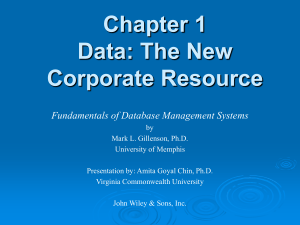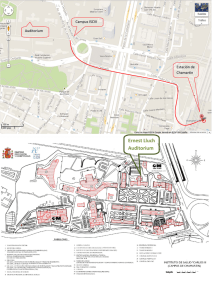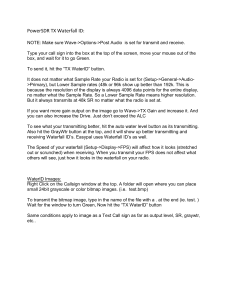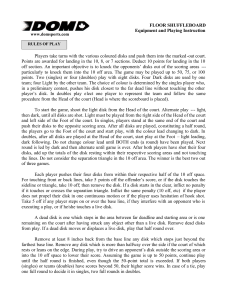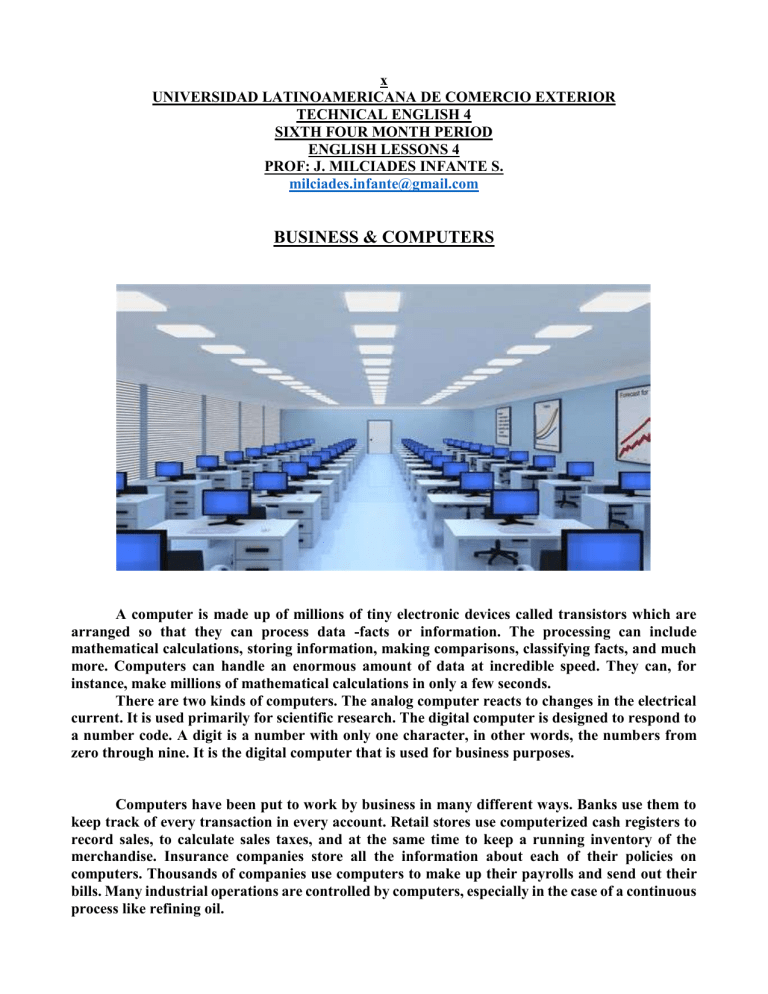
x UNIVERSIDAD LATINOAMERICANA DE COMERCIO EXTERIOR TECHNICAL ENGLISH 4 SIXTH FOUR MONTH PERIOD ENGLISH LESSONS 4 PROF: J. MILCIADES INFANTE S. [email protected] BUSINESS & COMPUTERS A computer is made up of millions of tiny electronic devices called transistors which are arranged so that they can process data -facts or information. The processing can include mathematical calculations, storing information, making comparisons, classifying facts, and much more. Computers can handle an enormous amount of data at incredible speed. They can, for instance, make millions of mathematical calculations in only a few seconds. There are two kinds of computers. The analog computer reacts to changes in the electrical current. It is used primarily for scientific research. The digital computer is designed to respond to a number code. A digit is a number with only one character, in other words, the numbers from zero through nine. It is the digital computer that is used for business purposes. Computers have been put to work by business in many different ways. Banks use them to keep track of every transaction in every account. Retail stores use computerized cash registers to record sales, to calculate sales taxes, and at the same time to keep a running inventory of the merchandise. Insurance companies store all the information about each of their policies on computers. Thousands of companies use computers to make up their payrolls and send out their bills. Many industrial operations are controlled by computers, especially in the case of a continuous process like refining oil. 2 Computers cannot perform all these tasks without instructions. A program is a detailed plan that a computer can follow in carrying out a particular task. Programmers arrange each piece of data and each operation into separate steps. The program is the input, the information that the machine processes to get the output, the result of the processing. The output will be no more accurate than the input. In other words, a computer is not more intelligent than the human beings who control it. The computer itself is only part of a total system. There must also be other devices for transmitting input to the machine and for receiving output. In some cases, the input is given to the machine in the form of cards in which holes have been punched. The cards are prepared on key punch machines that somewhat resemble typewriters. Magnetic tapes and disks that look like phonograph records are also used to transmit data to computers. Millions and millions of separate bits of information can be stored in a very small space on tapes and disks. Output can be received in many different ways. Some computers are connected to TV screens that show the output. Others are connected to machines that print the output at a high rate of speed. The output can also be punched on cards or recorded on tapes or disks. Many computers are connected to terminals in locations distant from the machines themselves. The connection is made by means of telephone or telegraph lines. Many of the terminals are designed both to transmit input to the computer and to receive output from it. Terminals make it possible for small companies to take advantage of computers. A company can lease, that is, rent_ time on a big computer that can handle work for a large number of organizations. ANSWER THE FOLLOWING QUESTIONS Answer only 15 questions on your own. 1. 2. 3. 4. 5. 6. What is computer made of? How are they arranged? What does data mean? What can computer processing include? What can computers handle? What is an example? How many kinds of computers are there? What is the analog computer react to? What is a digital computer designed to respond to? What is digit? The digital computer is designed to respond to a number code. A digit is a number with only one character, in other words, the numbers from zero through nine. 7. Which kind of computer is used for business purposes? It is the digital computer that is used for business purposes. 8. What do banks use computers for? Banks use them to keep track of every transaction in every account. 9. How do insurance companies use computers? Insurance companies store all the information about each of their policies on computers. 10. How do thousands of companies use computers? Thousands of companies use computers to make up their payrolls and send out their bills. 11. Are computers used by industries? Many industrial operations are controlled by computers, especially in the case of a continuous process like refining oil. 12. What is a program? A program is a detailed plan that a computer can follow in carrying out a particular task. 13. What do programmers do? Programmers arrange each piece of data and each operation into separate steps. 14. What is the input? What is the result of the processing? The program is the input, the information that the machine processes to get the output, the result of the processing. 15. How important are human beings in the computer process? In other words, a computer is not more intelligent than the human beings who control it. 16. In what form is information given to the machine in some cases? The computer itself is only part of a total system. There must also be other devices for transmitting input to the machine and for receiving output. In some cases, the input is given to the machine in the form of cards in which holes have been punched. 17. What other devices are used to transmit data to computers? Magnetic tapes and disks that look like phonograph records are also used to transmit data to computers. 18. Is output always received in the same way? What are some computers connected to? Output can be received in many different ways. Some computers are connected to TV screens that show the output. Others are connected to machines that print the output at a high rate of speed. 19. What are many computers connected to? Many computers are connected to terminals in locations distant from the machines themselves. 20. How is the connection made? The connection is made by means of telephone or telegraph lines. Many of the terminals are designed both to transmit input to the computer and to receive output from it. GRAMMAR LESSONS THE INTERROGATIVE WORDS THE INTERROGATIVES WHERE, WHEN, AND WHY WHERE: WHEN: WHY: Ask about the location of something. Ask about the time of some event. Ask about the purpose or reason for an action. The interrogative words where, when, and why require question word order. Where When Why QUESTION Is he going to go? is he going to go? is he going to go? is he going to go? SHORT ANSWER Yes, he is To the meeting At eight o’clock Because he’s the speaker. Where When Why Did did did did Yes, he did To his home. This afternoon. Because he needed them he he he he take them? take them? take them? take them? PRACTICE 1: Ask a QUESTION about the underlined part of each sentence. Use where, when, or why in each question. 1. He went to the party. ________________________________________________ 2. It happened about 4:00 p.m. ___________________________________________ 3. The clock is above the stove. ___________________________________________ 4. She put the cans in the cupboard. _______________________________________ 5. The furnace is in the basement. _________________________________________ 6. They came here for a vacation. _________________________________________ 7. The election will be in November. _______________________________________ 8. The chairs are in the other room. ________________________________________ 9. He is coughing because she has a cold. __________________________________ 10. The accident happened on Hill Street. ___________________________________ 11. Our classes usually begin at eight-thirty. ___________________________________ 12. There will be another meeting next weekend. _______________________________ 13. It’s cold because the furnace is out of order. _______________________________ 14. Tom’s birthday is on the seventeenth of July. _______________________________ 15. The bridge across the river is near the factory. _____________________________ PRACTICE 2: USE WHERE, WHEN, OR WHY IN EACH SENTENCE. 1. _____________ did you put it? 2. _____________ is the ladies’ room? 3. _____________ do they start school again? 4. _____________ is it going to be ready? 5. _____________ was the accident last night? 6. _____________ is Tom studying here tonight? 7. _____________ did you go there just now? 8. _____________ will they arrive at the airport? 9. _____________ are you so sure about that? 10. _____________ do cats like fish so much? 11. _____________ are you going home so soon? 12. _____________ was he late for class this morning? 13. _____________ does summer start in this country? 14. _____________ will be on the twenty-first of May? 15. _____________ did she go to the library after class? OBSERVATION: This assignment starts on Wednesday, November 9th, and ends on Wednesday, November 23 before midnight. In group of 3 or 4 students. Name(s): ________________________________ _________________________________ _________________________________ _________________________________
